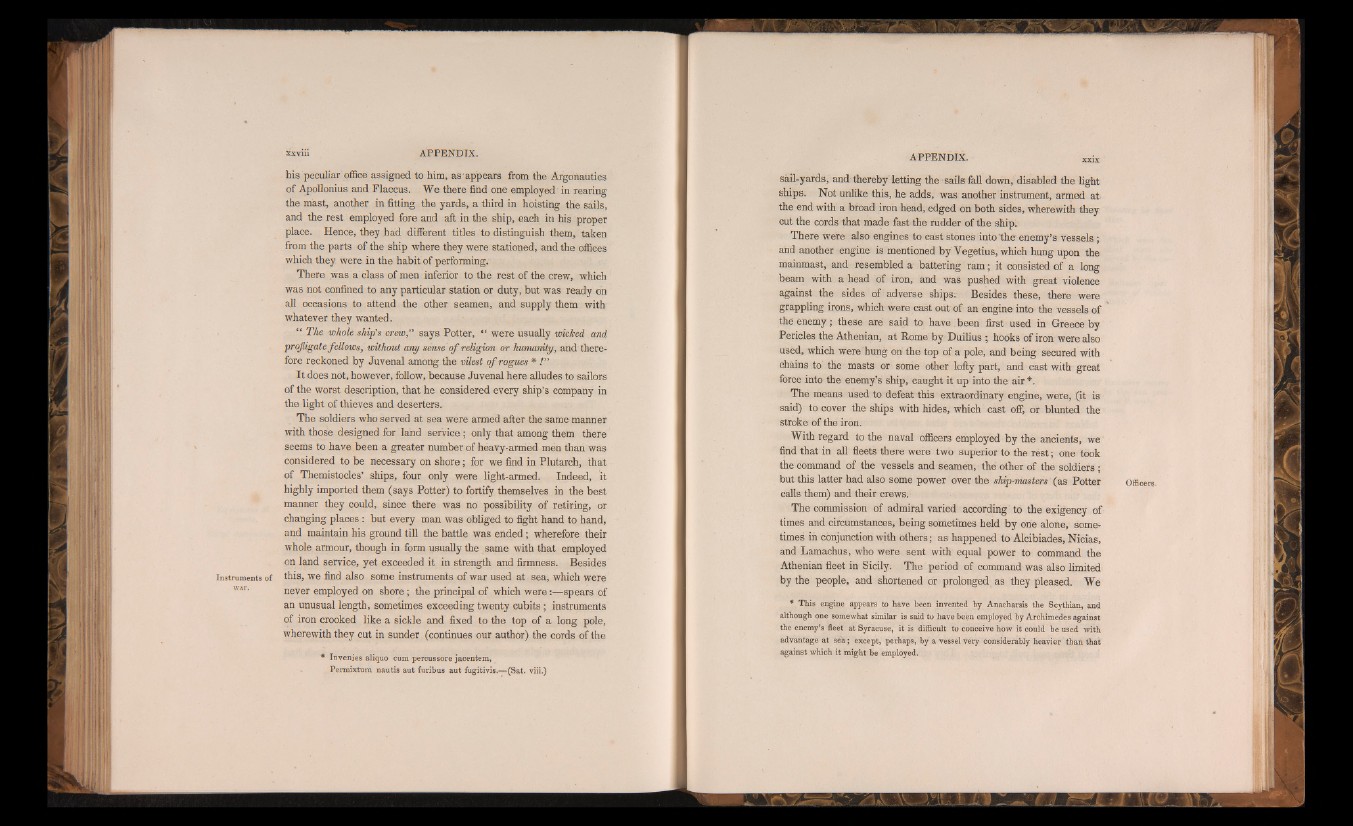
his peculiar office assigned to him, as appears from the Argonautics
of Apollonius and Flaccus. We there find one employed in rearing
the mast, another in fitting the yards, a third in hoisting the sails,
and the rest employed fore and aft in the ship, each in his proper
place. Hence, they had different titles to distinguish them, taken
from the parts of the ship where they were stationed, and the offices
which they were in the habit of performing.
There ,was a class of men inferior to the re st of the crew, which
was not confined to any particular station or duty, but was ready on
all occasions to attend the other seamen, and supply them with
whatever they wanted.
“ The whole ship’s crew," says Potter, “ were usually wicked and
profligate fellows, without any sense o f religion or humanity, and therefore
reckoned b y Juvenal among the vilest o f rogues *
I t does not, however, follow, because Juvenal here alludes to sailors
of the worst description, th a t he considered every ship’s company in
the light o f thieves and deserters.
The soldiers who served at sea were armed after the same manner
with those designed for land se rv ic e ; only that among them there
seems to have been a greater number of heavy-armed men than was
considered to b e necessary on sh o re ; for we find in Plutarch, that
of Themistodes’ ships, four only were light-armed. Indeed, it
highly imported them (says Potter) to fortify themselves in the best
manner they could, since there was no possibility o f retiring, or
changing p la c e s : but every man was obliged to fight hand to hand,
and maintain his ground till the battle was ended ; wherefore their
whole armour, though in form usually the same with th a t employed
on land service, yet exceeded it in strength and firmness. Besides
instruments of this, we find also some instruments of war used at sea, which were
war. never employed on sh o re ; th e principal of which w e re :—spears of
an unusual length, sometimes exceeding twenty cubits ; instruments
of iron crooked like a sickle and fixed to the top of a long pole,
wherewith they cut in sunder (continues our author) the cords of the
* Inverties aliquo cum percussore jacentem,
Permixtum nautis aut furibus aut fugitivis.—(Sat. viii.)
sáil-yards, and thereby letting the sails fall down, disabled the light
ships. Not unlike this, he adds, was another instrument, armed at
the end with a broad iron head, edged on both sides, wherewith they
cut the cords that made fast the rudder of the ship.
There were also engines to cast stones into th e enemy’s vessels ;
ahd another engine is mentioned b y Vegetius, which hung upon the
mainmast, and resembled a battering ram ; it consisted of a long
beam with a head of iron, and was pushed with gre a t violence
against the sides of adverse ships: Besides these, there were
grappling irons, which were cast out of an engine into the vessels of
the enemy; these aré said to have been first used in Greece by
Pericles the Athenian, a t Rome by Duilius ; hooks of iron were also
used, which were hung on the top of a pole, and being secured with
chains to the masts or some other lofty part, and cast with great
force into the enemy’s ship, caught it up into the air *.
The means used to defeat this extraordinary engine, were, (it is
said) to cover the ships with hides, which cast off, or blunted the
stroke of the iron.
With regard to the naval officers employed b y the ancients, we
find that in all fleets there were two superior to the rest ; one took
the command o f the vessels and seamen, the other of the soldiers ;
but this latter had also some power over the ship-masters (as Potter
calls them) and their crews.
The commission of admiral varied according to the exigency of
times and circumstances, being sometimes held b y one alone, sometimes
in conjunction with others ; as happened to Alcibiades, Nicias,
and Lamachus, who were sent with equal power to command the
Athenian fleet in Sicily. The period of command was also limited
by the people, and shortened or prolonged as they pleased. We
* This engine appears to have been invented by Anacharsis the Scythian, and
although one somewhat similar is said to have been employed by Archimedes against
the enemy’s fleet at Syracuse, it is diflicult to conceive how it could be used with
advantage at sea ; except, perhaps, by a vessel very considerably heavier than that
against which it might be employed.